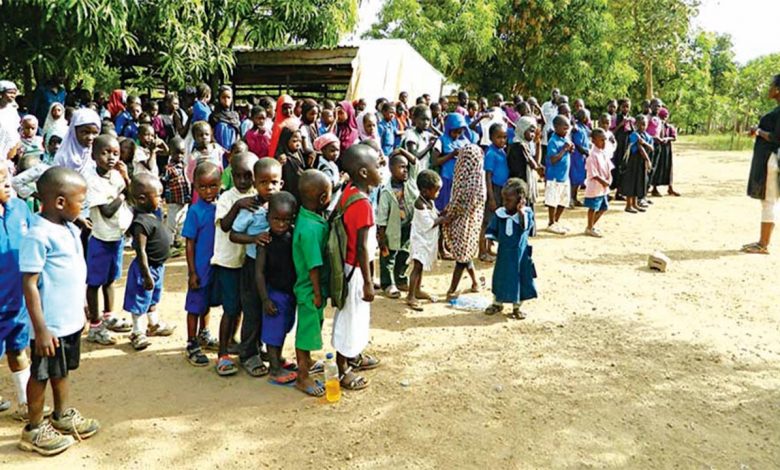What Is The Future For Borno’s Out-of-School Children?

There is a growing concern over the number of out-of-school children and the education system in Borno State, the epicentre of violent insurgency by Boko Haram and its splinter group, Islamic West Africa Province (ISWAP) since 2009.
A study published by the United Nations Children’s Agency in 2017 stated that over 2,295 teachers had been killed and another 19,000 displaced by the groups which campaign against western education.
The study also stated that an estimated 1,400 schools had been destroyed with the majority unable to open because of extensive damage or because they were in areas that were unsafe.
Ms Fatimah Wakilbe, the Co-founder of Priori Education Counselling, a non-profit organisation in Maiduguri that provides for over 200 children most of whom were orphaned during the insurgency shared her concerns with HumAngle.
Her foundation supports the children with varying materials from tuition, books, uniforms, sanitary products to feeding so they do not miss school.
She said, “The influence of violent extremism on impressionable children has been a concern for every parents and adult citizen in Borno, and to a large extent, still is. The case of indoctrination is a scary reality.
“The chances of children and young adults buying in to the radical ideals conceived by Boko Haram and the likes are quite high. We have seen that happen, albeit, less frequently of late,” Wakilbe said.
In February, Governor Babagana Umara Zulum at the foundation laying ceremony of a higher Islamic education school in Monguno, said the growing number of out-of-school children in the state was becoming worrisome to the government.
The governor said that there were more than 100,000 out-of-school children spread across the internally displaced people camps in Monguno town alone.
In 2014, the Borno State government began to build mega schools with the goal of absorbing orphans back to schools and providing education for all school-age children.
A senior government aide, Mr M. A. Busuguma, said, ‘’The state government is rebuilding destroyed schools. That is why school continued within the metropolis and in the southern part of Borno where the attack is very minimal.”
Local government areas such as Magumeri, Nganzai, Gubio, Mobbar, Monguno, Kukawa, Abadam, Marte, Dikwa, Ngala, Kala Balge are experiencing very low patronage despite the state government’s effort in building world-class schools.
The fear that Boko Haram will attack schools is still in the minds of parents, the official said, and added that the state government was doing its best to enlighten and encourage parents through giving free meals, uniforms, and books to students.
UNICEF said more than 3,500 children were recruited and used by non-state armed groups between 2013 and 2017. And In 2018, a total of 48 children (38 girls) were used in suicide attacks whilst 146 (45 boys, 101 girls) children were used in the same way in 2017.
In the first quarter of 2019, two girls were used as suicide bombers, UNICEF said and noted that out of school children were at risk of becoming economically disadvantaged and vulnerable to exploitation and recruitment by violent extremist groups.
Zulum during the presentation of Budget 2020 was quoted as saying: “This administration gives high premium to education because no genuine social transformation and economic development will take place without education.
“For us to find solution to the root causes of insurgency, we must revamp the education sector to cater for the teeming population, the school dropouts, and out-of-school children.
“We must improve on school infrastructure; ensure accessibility to quality education and build the capacity of the teachers.”
Walkibe said that ‘’A lot needs to be invested in the Borno education sector.
“Technology, to begin with, technology is becoming a big part of education even in developing countries.
“It is also widely known that in some parts of Borno, even the ‘chalk-board-paper and pencil’ learning is actually deficient.
“The world is increasingly becoming techno-savvy, it would be great to see a strong attempt in catching up. There should be more investment in the vocational sector).
” I would like to see a shift from conventional forms. In this case, a reversion to practices that best fit African realities.
“Skill acquisition should be promoted within education systems so students who do not make it into higher institutions have somethings else to fall back on,” she stressed.
Support Our Journalism
There are millions of ordinary people affected by conflict in Africa whose stories are missing in the mainstream media. HumAngle is determined to tell those challenging and under-reported stories, hoping that the people impacted by these conflicts will find the safety and security they deserve.
To ensure that we continue to provide public service coverage, we have a small favour to ask you. We want you to be part of our journalistic endeavour by contributing a token to us.
Your donation will further promote a robust, free, and independent media.
Donate Here




